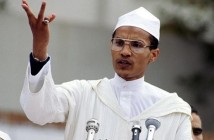 Jed Bartlet’s favorite catchphrase applies fully to the post-referendum environment in Morocco. Both domestically and abroad, Makhzen authorities have reasserted their strength and mastery of the national political agenda. I will certainly have an opportunity to go back on more details regarding the turnout, its geographical distribution and how its significance is more important as a symbol than their intrinsic levels.
Jed Bartlet’s favorite catchphrase applies fully to the post-referendum environment in Morocco. Both domestically and abroad, Makhzen authorities have reasserted their strength and mastery of the national political agenda. I will certainly have an opportunity to go back on more details regarding the turnout, its geographical distribution and how its significance is more important as a symbol than their intrinsic levels.
First off, let us have a look at the various feedbacks to our Basri-era phenomenal figure of 73.46% and:
Rabat – Le nombre des votants qui se sont prononcés en faveur du projet de nouvelle constitution a atteint 9.653.492, soit 98,50 pc, selon les résultats provisoires du référendum constitutionnel du vendredi, a indiqué, samedi, le ministre de l’Intérieur, M. Taieb cherqaoui. […] Selon les résultats provisoires du référendum tel que proclamés par les 39.969 bureaux de vote mis en place sur l’ensemble du territoire national, le nombre des inscrits a été de 13.451.404 électeurs, dont 9.881.922 votants, soit un taux de participation de 73,46 pc, a ajouté le ministre. (MAP Communiqué)
– Rabat. the total number of voters supporting the new draft constitution amounted to 9,653,492, i.e. 98.5% following provisional results from Referendum Day held on Friday. Interior Minister Taieb Cherqaoui announced on Saturday. […] provisional results are proclaimed accross the 39.969 polling stations spread across the nation. Total number of voters amounted to 13,451,404 among which 9,881,922 showed up, reaching a turnout of 73.46%
French foreign minister Alain Juppé supported the Referendum results in these terms:
“Selon les résultats partiels donnés par le Ministère de l’intérieur marocain, le pourcentage des votants qui se sont prononcés en faveur du projet de nouvelle constitution a été de 98,49 pour cent des personnes inscrites sur les listes électorales. Le nombre des votants s’est élevé à 9.228.020, soit un taux de participation de 72,65 pour cent.
Nous devons bien entendu attendre les chiffres définitifs, mais il apparait d’ores et déjà que le peuple marocain a pris une décision claire et historique. […] La révision de la constitution a été conduite à partir de consultations étendues, associant tous les partis politiques, les syndicats et une large palette de représentants de la société civile.
Nous saluons la forte participation du peuple marocain à ce référendum. Elle a donné lieu à des débats animés et substantiels, reflétés dans les médias et notamment sur internet.[…]La France se tient naturellement aux cotés du Maroc pour l’accompagner dans cette nouvelle ère et forme des vœux pour que la mise en œuvre de cette nouvelle constitution s’accompagne de nouveaux progrès et de nouvelles réussites.”
As for the United States State Department, the language was equally praising and very supportive of the Referendum, but more cautious and overall non-committal to the whole process, indeed:
The United States welcomes Morocco’s July 1 constitutional referendum. We support the Moroccan people and leaders in their efforts to strengthen the rule of law, raise human rights standards, promote good governance, and work toward long-term democratic reform that incorporates checks and balances. We look forward to the full implementation of the new constitution as a step toward the fulfilment of the aspirations and rights of all Moroccans.
Short, succinct and positively abstract. The State Department commits to nothing and keeps its options open.
Finally, the European Union press release doesn’t deviate from the quasi-unanimous praises of our referendum:
“We welcome the positive outcome of the referendum on the new Constitution in Morocco and commend the peaceful and democratic spirit surrounding the vote,” EU foreign policy chief Catherine Ashton and neighbourhood policy commissioner Stefan Fuele said in a joint statement. […]
“The reforms proposed in it constitute a significant response to the legitimate aspirations of the Moroccan people and are consistent with Morocco’s Advanced Status with the EU,” the said. “Now we encourage the swift and effective implementation of this reform agenda,” the statement said.
[…] “The European Union is ready to fully support Morocco in this endeavour.”
So in diplomatic terms, our significant partners are basically accepting the result, and this international support -some might consider it to be a blank check- makes the regime more secure and confirms its hegemony over the Moroccan political discourse.
“How on earth did they manage such a score?”
This is even more obvious domestically: even though charges of ballot-stuffing and incoherent figures tarnished the referendum’s credibility, lambda Moroccans will not gainsay the result. The typical Moroccan voter (Male, Father of three children and living in a rural or sub-urban area) is more than likely to have voted for the constitution, not because what they would have read was interesting and appealing to their grievances, but because of multifarious factors: their social environment does not allow for criticism, individual decision-making or the use of Cartesian logics. Do I sound elitist and full of contempt? Perhaps I do. But the figures speak for themselves: the highest turnout figures were recorded in regions like Oued Ed-Dahab-Lagouira (92.19%) Guelmim-Es Smara (86.76%) Laâyoune-Boujdour-Sakia el Hamra (84.05%) and Doukkala-Abda (80.06%) All three regions are very tribal, and rely heavily on Makhzen administration for favours and other privileges, thus the higher outcome compared to national turnout. Conversely, low turnout in Casablanca and Rabat (respectively 57.17% and 72.39%) are thus because of its more individualistic, or shall we say more community-oriented settings, plus local administration has less leverage over its denizens, and so less likely to persuade them to vote (one way or the other).
The pro-democracy platform needs to pack up and look for new issues to campaign on, simply because the showdown that took place ever since February 20th is coming to an end, and not the movement’s advantage. The referendum might have been fixed, perhaps there will never be a solid body of evidence to suggest a nation-wide ballot-stuffing, and the absence of impartial scrutiny has a lot to do with it -perhaps if the retained option was a No-vote instead of an all-out boycott, there would have been some civic control over referendum proceedings. Furthermore, and because of the comparatively few people who took to the streets last week and today only confirm Moroccan apathy -and implicit acceptance- towards the referendum results.
The whiff of fresh air brought by the Feb20 demonstrations into the hermetical Moroccan political house, it seems, is losing speed. The long overdue New Politics many of us have been awaiting is yet again postponed to an unspecified date. Subsequently, there is a need to turn the public’s attention to more relevant issues: the national economy and the economics of national debt; the crumbling standards in public sector departments like Health and Education. More down to earth, issues that matter to the public are few and pressing: employment, standards of living and education for the future generations.
Paradoxically, these are the issues that explain the already existing and dangerously exacerbated social tensions between the haves and havenots. In between, our very own “squeezed middle” are the ones paying for these tensions, whether in demonstrations or just as a scapegoat for social resentment. I wish there was some sociological review of Feb20 prominent members; I would bet good money that many of these are of Middle-Class background, and those attacking them -the so-called “Baltagyas”- are from lower income and social classes. In any case, waging a political agenda does not seem to gather a lot of durable support, and that is why something else needs to be done.
Constitutional reforms can no longer be used as flag to rally dissatisfied individuals and communities. Rather, a more down-to-earth set of agenda focused on these immediate needs can win favours and support to build on more political and strategic grievances later on.
http://www.moroccoboard.com/viewpoint/124-zouhair-baghough-/5353-morocco-what-next-after-referendum






